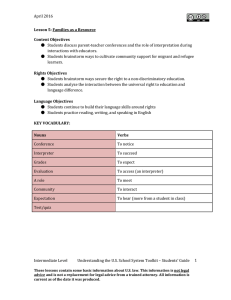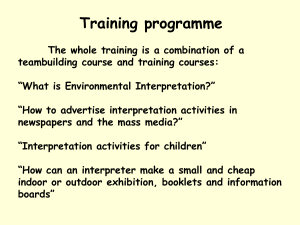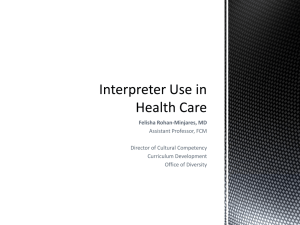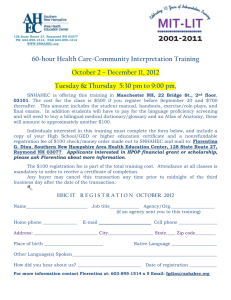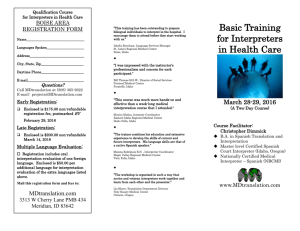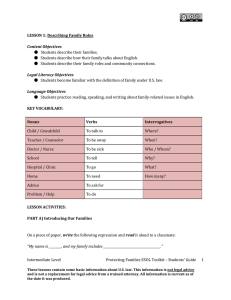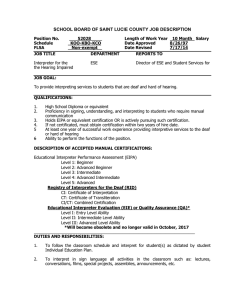April 2016 Lesson 5: Families as a Resource
advertisement
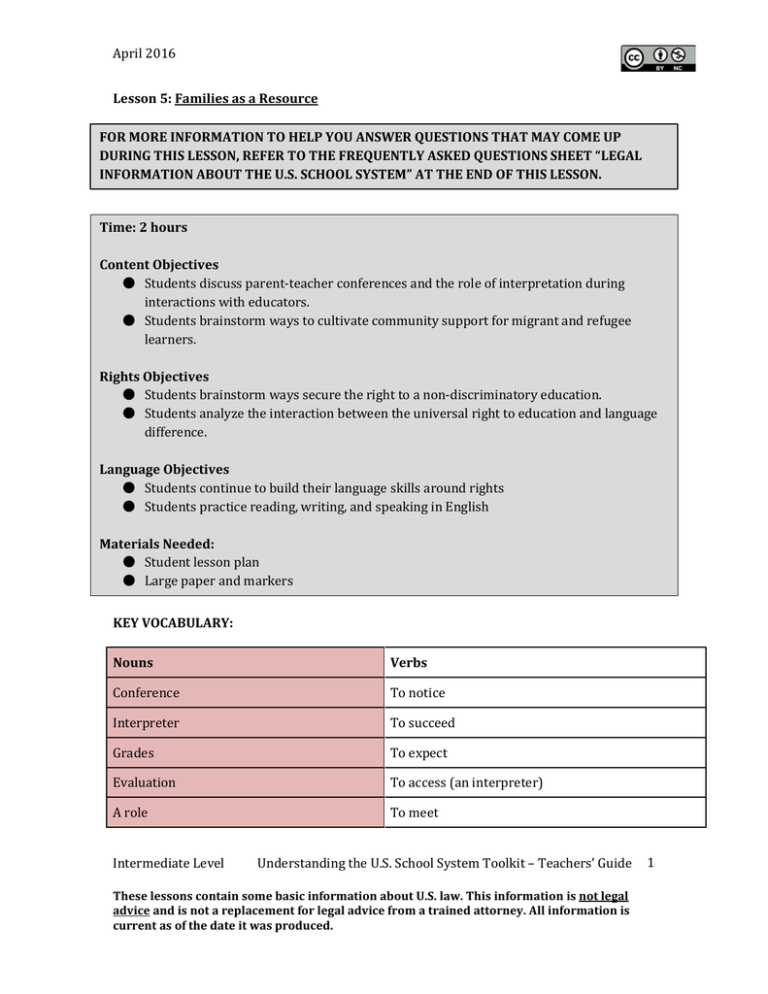
April 2016 Lesson 5: Families as a Resource FOR MORE INFORMATION TO HELP YOU ANSWER QUESTIONS THAT MAY COME UP DURING THIS LESSON, REFER TO THE FREQUENTLY ASKED QUESTIONS SHEET “LEGAL INFORMATION ABOUT THE U.S. SCHOOL SYSTEM” AT THE END OF THIS LESSON. Time: 2 hours Content Objectives ● Students discuss parent-teacher conferences and the role of interpretation during interactions with educators. ● Students brainstorm ways to cultivate community support for migrant and refugee learners. Rights Objectives ● Students brainstorm ways secure the right to a non-discriminatory education. ● Students analyze the interaction between the universal right to education and language difference. Language Objectives ● Students continue to build their language skills around rights ● Students practice reading, writing, and speaking in English Materials Needed: ● Student lesson plan ● Large paper and markers KEY VOCABULARY: Nouns Verbs Conference To notice Grades To expect Interpreter Evaluation A role Intermediate Level To succeed To access (an interpreter) To meet Understanding the U.S. School System Toolkit – Teachers’ Guide These lessons contain some basic information about U.S. law. This information is not legal advice and is not a replacement for legal advice from a trained attorney. All information is current as of the date it was produced. 1 April 2016 Community To interact Expectation To hear (more from a student in class) Test/quiz LESSON ACTIVITIES: PART A) Talking about School Conferences and Using Interpreters The purpose of the following activity is to explore students’ perceptions of American school conferences and the use of interpreters in this setting. Guide students through an exercise where they look closely at the pictures below and build an understanding by first noting details about the pictures and then moving to comparisons between what they perceive and their own experiences. If possible, project the pictures largely in addition to providing printed copies of them through the student lesson handout. Look closely at the following picture of a mother (left) participating in a school conference with her daughter’s high school teacher (right), using an interpreter (center). o o Source: http://www.nytimes.com/2010/03/20/nyregion/20bigcity.html What details do you notice about this picture? Write what you notice down on a white board or piece of paper everyone can see. Share what is different or the same about this meeting and interactions with teachers in your country or with your children’s teachers. Intermediate Level Understanding the U.S. School System Toolkit – Teachers’ Guide These lessons contain some basic information about U.S. law. This information is not legal advice and is not a replacement for legal advice from a trained attorney. All information is current as of the date it was produced. 2 April 2016 Together the woman and her daughter’s teacher review her daughter’s grades and other evaluations of her daughter’s school performance. With the help of her interpreter, the woman asks questions and talks with the teacher about how to help her daughter be successful in school. o o Source: http://www.nytimes.com/2010/03/20/nyregion/20bigcity.html What details do you notice about this picture? Write what you notice down on a white board or piece of paper everyone can see. Share what is different or the same about this meeting and interactions with teachers in your country or with your children’s teachers. Intermediate Level Understanding the U.S. School System Toolkit – Teachers’ Guide These lessons contain some basic information about U.S. law. This information is not legal advice and is not a replacement for legal advice from a trained attorney. All information is current as of the date it was produced. 3 April 2016 PART B) Reading He’s Story The purpose of the following activity is to further explore students’ perceptions of school conferences and working with interpreters in this setting. Students will read the following passage about a parent-teacher conference at Stuyvesant High School in New York. The instructor should determine which of the following reading situations best suits students’ literacy levels and needs: o A whole-class reading, guided by the instructor o Semi-independent reading in groups or pairs, supported by a circulating instructor o A split class, where some students are guided by the instructor and some work independently Make sure students have the time and support needed to answer the accompanying comprehension and discussion questions. Read the story below as a class or in small groups. If you choose, write your answers to the questions that follow in the spaces provided. Discuss your answers in English or (when possible) your native language. “At Stuyvesant, Interpreting Parent-Teacher Night” By Susan Dominus [Adapted] He Qiu Hua, a mother of two who moved to New York in 1992, walked quickly from floor to floor the other night, holding a piece of paper with room numbers on it, staying close to Ms. Cheng, her interpreter, who came to New York last year from Wuhan, China. Once inside a math classroom, Ms. Hua listened to Ms. Cheng as she interpreted the teacher’s words: The second quiz was not as good as he might have liked; Ms. Hua’s daughter was very quiet; he would like to hear more from her in class. In a meeting with a science teacher, Ms. Cheng smiled as she told Ms. Hua that her daughter’s lab work was very good. Source: Adapted from http://www.nytimes.com/2010/03/20/nyregion/20bigcity.html o What is Ms. Hau’s role in the school conference? What is Ms. Cheng’s role? _________________________________________________________________________________________________________ _________________________________________________________________________________________________________ o What would you want or expect from an interpreter during a school conference? _________________________________________________________________________________________________________ Intermediate Level Understanding the U.S. School System Toolkit – Teachers’ Guide These lessons contain some basic information about U.S. law. This information is not legal advice and is not a replacement for legal advice from a trained attorney. All information is current as of the date it was produced. 4 April 2016 _________________________________________________________________________________________________________ o What might be hard or problematic about using an interpreter during a school conference? How could these challenges be addressed, if at all? _________________________________________________________________________________________________________ _________________________________________________________________________________________________________ o How do people in your community or your child’s school access interpreters? _________________________________________________________________________________________________________ _________________________________________________________________________________________________________ PART C) Final Reflections The instructor should invite students to share their answers to the following questions. Record students’ ideas on the board. Then, invite students to brainstorm how they might access and get the most out of using an interpreter during a school conference, or otherwise engage with their children’s teachers. As a class, discuss your answers to the following questions, considering your experiences and those of people you know who are immigrants or refugees. o o o o What might be hard or problematic about using an interpreter during a school conference? How could these challenges be addressed, if at all? How do people in your community or your child’s school access interpreters? How do U.S. teachers expect families to help students? How do these expectations affect immigrant and non-immigrant families differently? How else do adults who are immigrants or refugees help their family members with school? Intermediate Level Understanding the U.S. School System Toolkit – Teachers’ Guide These lessons contain some basic information about U.S. law. This information is not legal advice and is not a replacement for legal advice from a trained attorney. All information is current as of the date it was produced. 5 April 2016 Intermediate Level Understanding the U.S. School System Toolkit – Teachers’ Guide These lessons contain some basic information about U.S. law. This information is not legal advice and is not a replacement for legal advice from a trained attorney. All information is current as of the date it was produced. 6
